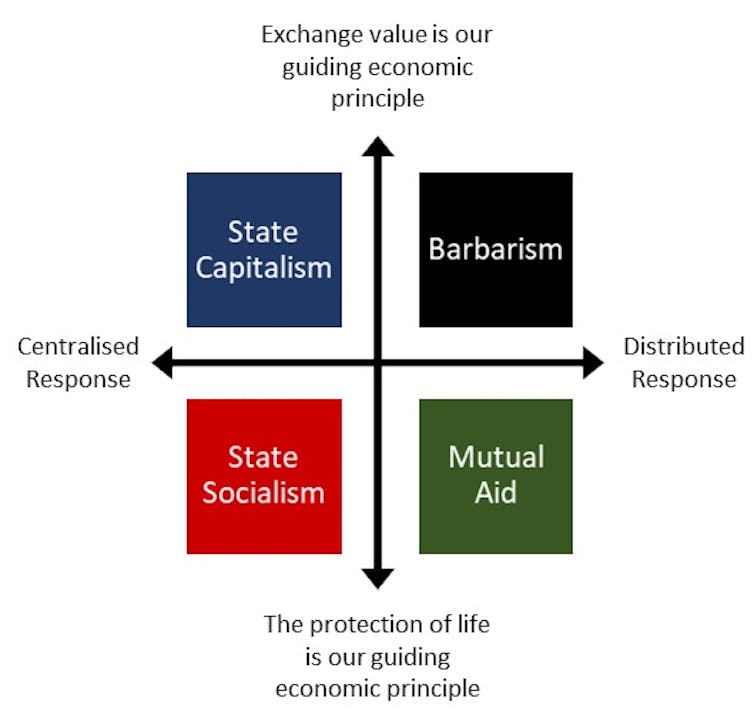Why Coronavirus May Change the World (For Better or Worse)
Where will we be in six months? A year?
Second, jobs in many critical services aren’t those that tend to be highest valued in society. Many of the best paid jobs only exist to facilitate exchanges; to make money. They serve no wider purpose to society: they are what the anthropologist David Graeber calls “bullshit jobs”. Yet because they make lots of money we have lots of consultants, a huge advertising industry and a massive financial sector. Meanwhile, we have a crisis in health and social care, where people are often forced out of useful jobs they enjoy, because these jobs don’t pay them enough to live.
Pointless jobs
The fact that so many people work pointless jobs is partly why we are so ill prepared to respond to COVID-19. The pandemic is highlighting that many jobs are not essential, yet we lack sufficient key workers to respond when things go bad.
People are compelled to work pointless jobs because in a society where exchange value is the guiding principle of the economy, the basic goods of life are mainly available through markets. This means you have to buy them, and to buy them you need an income, which comes from a job.
The other side of this coin is that the most radical (and effective) responses that we are seeing to the COVID-19 outbreak challenge the dominance of markets and exchange value. Around the world governments are taking actions that three months ago looked impossible. In Spain, private hospitals have been nationalised. In the UK, the prospect of nationalising various modes of transport has become very real. And France has stated its readiness to nationalise large businesses.
Likewise, we are seeing the breakdown of labour markets. Countries like Denmark and the UK are providing people with an income in order to stop them from going to work. This is an essential part of a successful lockdown. These measures are far from perfect. Nonetheless, it is a shift from the principle that people have to work in order to earn their income, and a move towards the idea that people deserve to be able to live even if they cannot work.
This reverses the dominant trends of the last 40 years. Over this time, markets and exchange values have been seen as the best way of running an economy. Consequently, public systems have come under increasing pressures to marketise, to be run as though they were businesses who have to make money. Likewise, workers have become more and more exposed to the market – zero-hours contracts and the gig economy have removed the layer of protection from market fluctuations that long term, stable, employment used to offer.
COVID-19 appears to be reversing this trend, taking healthcare and labour goods out of the market and putting it into the hands of the state. States produce for many reasons. Some good and some bad. But unlike markets, they do not have to produce for exchange value alone.
These changes give me hope. They give us the chance to save many lives. They even hint at the possibility of longer term change that makes us happier and helps us tackle climate change. But why did it take us so long to get here? Why were many countries so ill-prepared to slowdown production? The answer lies in a recent World Health Organisation report: they did not have the right “mindset”.
Our economic imaginations
There has been a broad economic consensus for 40 years. This has limited the ability of politicians and their advisers to see cracks in the system, or imagine alternatives. This mindset is driven by two linked beliefs:
- The market is what delivers a good quality of life, so it must be protected
- The market will always return to normal after short periods of crisis
These views are common to many Western countries. But they are strongest in the UK and the US, both of which have appeared to be badly prepared to respond to COVID-19.
In the UK, attendees at a private engagement reportedly summarised the Prime Minister’s most senior aide’s approach to COVID-19 as “herd immunity, protect the economy, and if that means some pensioners die, too bad”. The government has denied this, but if real, it’s not surprising. At a government event early in the pandemic, a senior civil servant said to me: “Is it worth the economic disruption? If you look at the treasury valuation of a life, probably not.”
This kind of view is endemic in a particular elite class. It is well represented by a Texas official who argued that many elderly people would gladly die rather than see the US sink into economic depression. This view endangers many vulnerable people (and not all vulnerable people are elderly), and, as I have tried to lay out here, it is a false choice.
One of the things the COVID-19 crisis could be doing, is expanding that economic imagination. As governments and citizens take steps that three months ago seemed impossible, our ideas about how the world works could change rapidly. Let us look at where this re-imagining could take us.
Four futures
To help us visit the future, I’m going to use a technique from the field of futures studies. You take two factors you think will be important in driving the future, and you imagine what will happen under different combinations of those factors.
The factors I want to take are value and centralisation. Value refers to whatever is the guiding principle of our economy. Do we use our resources to maximise exchanges and money, or do we use them to maximise life? Centralisation refers to the ways that things are organised, either by of lots of small units or by one big commanding force. We can organise these factors into a grid, which can then be populated with scenarios. So we can think about what might happen if we try to respond to the coronavirus with the four extreme combinations:
1) State capitalism: centralised response, prioritising exchange value
2) Barbarism: decentralised response prioritising exchange value
3) State socialism: centralised response, prioritising the protection of life
4) Mutual aid: decentralised response prioritising the protection of life.

State capitalism
State capitalism is the dominant response we are seeing across the world right now. Typical examples are the UK, Spain and Denmark.
The state capitalist society continues to pursue exchange value as the guiding light of the economy. But it recognises that markets in crisis require support from the state. Given that many workers cannot work because they are ill, and fear for their lives, the state steps in with extended welfare. It also enacts massive Keynesian stimulus by extending credit and making direct payments to businesses.
The expectation here is that this is will be for a short period. The primary function of the steps being taken is to allow as many businesses as possible to keep on trading. In the UK, for example, food is still distributed by markets (though the government has relaxed competition laws). Where workers are supported directly, this is done in ways that seek to minimise disruption normal labour market functioning. So, for example, as in the UK, payments to workers have to be applied for and distributed by employers. And the size of payments is made on the basis of the exchange value a worker usually creates in the market, rather than the usefulness of their work.
Could this be a successful scenario? Possibly, but only if COVID-19 proves controllable over a short period. As full lockdown is avoided to maintain market functioning, transmission of infection is still likely to continue. In the UK, for instance, non-essential construction is still continuing, leaving workers mixing on building sites. But limited state intervention will become increasingly hard to maintain if death tolls rise. Increased illness and death will provoke unrest and deepen economic impacts, forcing the state to take more and more radical actions to try maintain market functioning.
Barbarism
This is the bleakest scenario. Barbarism is the future if we continue to rely on exchange value as our guiding principle and yet refuse to extend support to those who get locked out of markets by illness or unemployment. It describes a situation that we have not yet seen.
Businesses fail and workers starve because there are no mechanisms in place to protect them from the harsh realities of the market. Hospitals are not supported by extraordinary measures, and so become overwhelmed. People die. Barbarism is ultimately an unstable state that ends in ruin or a transition to one of the other grid sections after a period of political and social devastation.
Could this happen? The concern is that either it could happen by mistake during the pandemic, or by intention after the pandemic peaks. The mistake is if a government fails to step in in a big enough way during the worst of the pandemic. Support might be offered to businesses and households, but if this isn’t enough to prevent market collapse in the face of widespread illness, chaos would ensue. Hospitals might be sent extra funds and people, but if it’s not enough, ill people will be turned away in large numbers.

